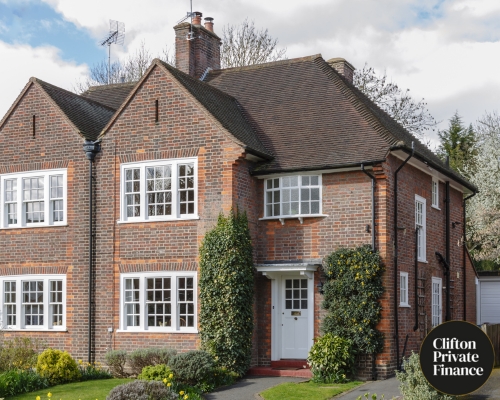Categories
Can I Remortgage Early On A Fixed Rate?

There are many reasons you may be asking, "Can I remortgage early?" - from releasing equity to securing better interest rates. But there are a few obstacles you may need to overcome if you want to exit your mortgage deal before it's finished.
You're considering switching your mortgage deal but are not yet at the end of your fixed-rate term. It's definitely doable, but there is some fine print you'll need to be aware of.
Most mortgage lenders allow you to apply for a product transfer up to 6 months before your current deal ends (or at any time if you're already paying your bank's SVR - Standard Variable Rate).
So, you can get a quote today (either fixed or tracker) and have up to 6 months to decide whether to take it.
When your current deal expires, you can take the quote you got six months ago or, if rates have gone down since then, your lender's new offer—whichever is cheaper.
You just need to know your lender's remortgage timeframe because you don't want to pay any ERCs to switch early.
Most banks offer 3-6 months leeway, but here's a comprehensive list of the leading providers in the UK:
| Lender | When you can start the product transfer process |
|---|---|
| Barclays | 6 months |
| Co-op | 4 months |
| First Direct | 6 months |
| Halifax | 3 months |
| HSBC | 6 months |
| Lloyds | 3 months |
| Nationwide | 4 months |
| NatWest | 3 months |
| Santander | 4 months |
| Virgin Money | 4 months |
| Yorkshire Bank | 3 months |
*accurate as of June 2023.
In the rest of this article, we'll answer the key questions surrounding remortgaging early:
Is it a good idea to remortgage early? What are the pros and cons? Will I be charged? Stick around to find out.
What is a Fixed-Rate Mortgage?
Fixed-rate mortgages are home loans in which the interest rate remains the same for a set period, usually between 2 and 10 years. They offer the security of knowing exactly how much you will pay each month, so your loan repayments will not fluctuate with interest rates, especially when they rise.
The most common mortgages on the market have fixed rates of 2-5 years. When your fixed-rate mortgage ends, you are automatically switched to the lender's standard variable rate (SVR), which is often much higher than the one you have been paying.
Most people remortgage around 6 months before their fixed-rate mortgage ends to find a new rate before their introductory rates period ends.
How Soon Can You Remortgage Before a Fixed Rate Ends?
Due to the 6-month mortgage rule, remortgaging within the first 6 months of taking out your fixed-rate mortgage is difficult. However, you can remortgage at any time after this. Whether it's a good idea depends on what you stand to gain from remortgaging.
Remortgaging before your fixed-rate period ends may result in early repayment charges. The length of the deal you want to exit is also a key factor—two-year deals cost less to exit than five - or 10-year deals. In evaluating the benefits of switching mortgage products, you should consider the costs of leaving your current deal.
Most people are content to stick with their current fixed-rate deal until it ends, but there are good reasons to remortgage early, which we see below.
Should You Remortgage Early?
Whether you should remortgage early depends on whether you are better off with a new mortgage product and whether the cost of remortgaging early outweighs the benefits.
Is it worth remortgaging early?
Most people will wait for a fixed term to end before remortgaging to find better rates, especially if it's only a 2-year deal and they can wait. But there are several scenarios where remortgaging can make sense.
- Remortgage to get cheaper rates
If you find a mortgage with lower rates than you currently pay, it may be smart if the savings you'll enjoy on the new mortgage outweigh the cost of any early repayment fees.
- Remortgage to raise cash
You could urgently need to raise cash for private medical bills or home repairs. Or you may have built up significant equity in your home or seen its value increase. In this case, you can remortgage early, cover any early repayment costs, and release this capital for an important project you want to take on—such as building a house extension or purchasing a second investment property.
- Remortgage to consolidate debt
It may make sense to remortgage early to pay off your other short-term debts. Rolling up all your debts into one mortgage payment can be much cheaper overall.
- Remortgage for a more flexible product
Circumstances can change, and it's possible to fall ill or lose your job and need to take a mortgage payment holiday as a result. You may also want a mortgage that can make interest-only payments or overpayments. Remortgaging to a more flexible mortgage product in these circumstances can be beneficial, especially if you still have many years to go before your current deal expires.
Speaking to a specialist mortgage broker can be helpful as you weigh up whether you should remortgage or not. With a vast knowledge of the mortgage market and access to specialist lenders, they can help you assess your current situation to see if there is a mortgage product that will make remortgaging worthwhile.

Should I Remortgage with the Same Lender?
Sticking with the same lender means you already have a relationship with them, and they have your financial history on file, which might streamline the application process. Additionally, some lenders offer existing customers incentives to remortgage with them, such as reduced fees or lower interest rates.
However, your current lender might not offer the most competitive rates or terms on the market. By limiting your options to one lender, you could potentially miss out on better deals elsewhere.
While some lenders offer incentives to retain customers, others might not provide any benefits for staying with them, meaning you could miss out on potential savings. Remortgaging with a different lender allows you to compare rates, fees, and terms across multiple providers, potentially finding a deal that better suits your needs.
How to Remortgage A House Early
The first step is to search the mortgage market, comparing lenders and deals thoroughly. You should also contact your current lender to see what early repayment fees you will need to pay if you exit your fixed rate early.
To compare the best rates, you could use a specialist mortgage broker who has access to specialist lenders and deals you won't find on mortgage comparison sites.
Remortgage with the same lender
It’s known as a ‘product transfer’ when you remortgage with your existing lender. This is typically the easiest way to remortgage because your current lender knows all about you and your property.
It is usually less expensive since you won't have to pay solicitor and valuation fees, and your lender may even waive any ERCs.
However, it is a good idea to compare your current mortgage lender with other lenders since they cannot always compete with other mortgage products on the market, particularly products that will make remortgaging worthwhile.
Remortgage with a new lender
Switching to a new lender may be necessary to get the best rates or terms you need, but the process is more complex and takes longer than remaining with your current lender.
You will almost definitely have to pay early repayment fees to your current lender, and a new lender may also charge you valuation and solicitor fees. However, these are often waived when you take out a new mortgage deal.
It's essential to weigh the costs and benefits of switching mortgage lenders in time and money. The long-term benefits of remortgaging with a new lender can outweigh any upfront costs.
Should you go with a fixed rate or a tracker? Our video below covers the pros and cons of each option.
What Are The Costs of Remortgaging Early?
Two types of costs are involved with remortgaging a property early - the cost of leaving your current mortgage and setting up a new one. It depends on your situation, but here are some fees you should know.

How To Get the Best Remortgage Deal
At Clifton Private Finance, we can help you secure a remortgage or product transfer remortgage before your fixed rate ends.
Our expert remortgage brokers can review your situation and advise you on the best course of action using their expertise and access to specialist lenders and the whole mortgage market. There is no charge for an initial consultation and in-depth review of your situation.
To see what we can do for you call us on 0203 900 4322 or book a free consultation below.









.png)

